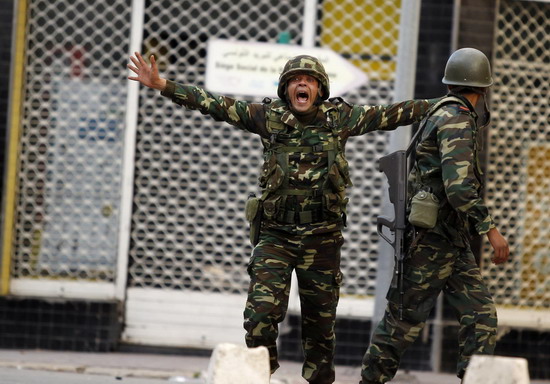Photos
Tunisian leader flees amid unrest, PM takes over
Updated: 2011-01-15 04:04
(Agencies)
|
|
The state of emergency remained in effect after the prime minister's announcement, and the streets of central Tunis fell quiet after a day of rioting and volleys of tear gas. A black armored vehicle stood behind the Interior Ministry.
The 74-year-old leader came to power in a bloodless coup in 1987. He took over from a man called formally President-for-Life, Habib Bourguiba, the founder of modern-day Tunisia who set the Muslim country on a pro-Western course after independence from France in 1956.
Ben Ali removed Bourguiba from office for "incompetence," saying he had become too old, senile and sick to rule. Ben Ali promised then that his leadership would "open the horizons to a truly democratic and evolved political life."
But after a brief period of reforms early on, Tunisia's political evolution stopped.
US diplomatic cables released by WikiLeaks have called Tunisia a "police state" and described the corruption there, saying Ben Ali had lost touch with his people. Social networks like Facebook helped spread the comments to the delight of ordinary Tunisians, who have complained about the same issues for years.
Under Ben Ali, most opposition parties were illegal. Amnesty International said authorities infiltrated human rights groups and harassed dissenters. Reporters Without Borders described Ben Ali as a "press predator" who controlled the media.
He consistently won elections with overwhelmingly questionable scores: In 2009, he was re-elected for a fifth five-year term with 89 percent of the vote. Beforehand, he had warned opponents they would face legal retaliation if they questioned the vote's fairness.
The riots started after an educated but jobless 26-year-old committed suicide in mid-December when police confiscated the fruits and vegetables he was selling without a permit. His desperate act hit a nerve, sparked copycat suicides and focused generalized anger against the regime into a widespread, outright revolt.
In Washington, National Security Council spokesman Mike Hammer said the US government, an ally of Tunisia in the war against terror, was monitoring the developments.
"We condemn the ongoing violence against civilians in Tunisia, and call on the Tunisian authorities to fulfill the important commitments made by President Ben Ali in his speech yesterday to the Tunisian people, including respect for basic human rights and a process of much-needed political reform," he said.
|
|
E-paper

Ear We Go
China and the world set to embrace the merciful, peaceful year of rabbit
Preview of the coming issue
Carrefour finds the going tough in China
Maid to Order
Specials

Mysteries written in blood
Historical records and Caucasian features of locals suggest link with Roman Empire.

Winning Charm
Coastal Yantai banks on little things that matter to grow

New rules to hit property market
The State Council launched a new round of measures to rein in property prices.


